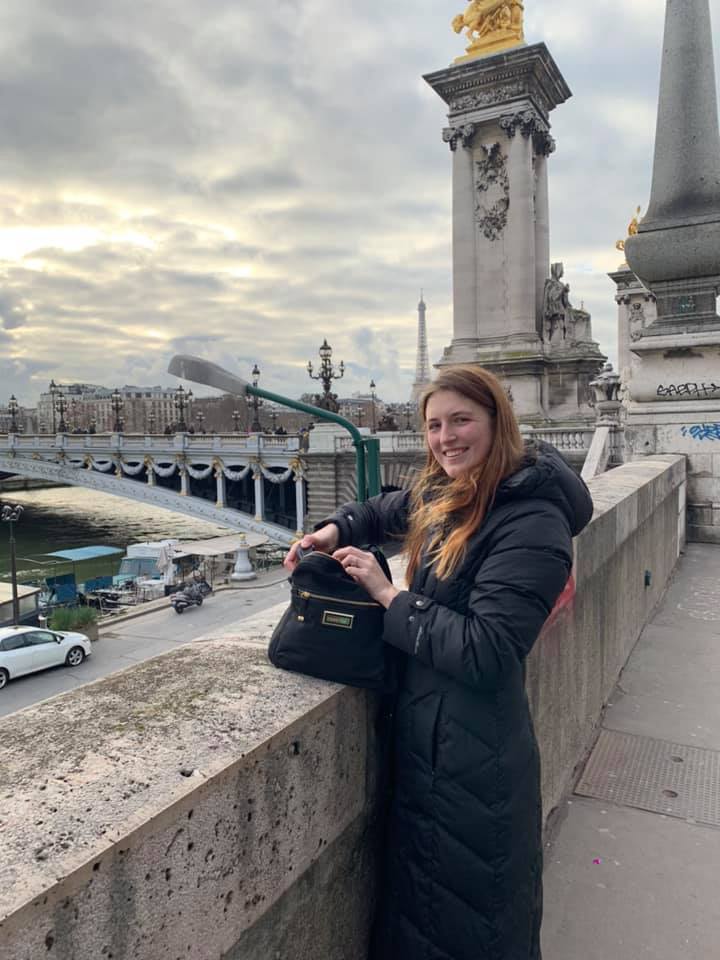For this edition of Texas Law’s Student Spotlight series, meet 2L Caroline Burks, managing editor of the Texas Intellectual Property Law Journal, director of development for The Review of Litigation, former co-president of Texas Law Disability Alliance, Cybersecurity Graduate Fellow, and Brumley Next Generation Fellow!

Q: Wow, you have held an impressive array of leadership positions since you came to Texas Law! How has serving in those roles impacted your law school experience?
I really enjoyed being the co-president of Texas Law Disability Alliance because it is an organization that speaks to me personally, as a disabled law student, but also because I believe the legal profession, in general, has a terrible relationship with mental health, which can lead to disability. For one of our mental health initiatives, the TLDA board set up a new event called Character & Fitness, an accessible alternative to Bar Review, which was meant to reach out to students with families, students with a history of alcoholism, and students who simply didn’t want to go to clubs or bars. My former co-president and the now-president, Olivia Lu, was also instrumental in setting up the National Disabled Law Student Association with similar law school organizations across the country.
My experience in fundraising and event planning for TLDA helped me to earn my position as Managing Editor for the Texas Intellectual Properly Law Journal and Director of Development for The Review of Litigation. Journals and organizations are fantastic opportunities for networking and professional development. I recommend getting involved wherever you can at the Law School!
Q: Could you tell us a bit about your interest and experience in national security?
I am interested in how national security intersects with cybersecurity both professionally and personally. I am a Cybersecurity Graduate Fellow and also a Brumley Next Generation Fellow at the Robert Strauss Center for International Security and Law. I’m planning to do technology and telecommunications patent litigation after law school, and security has recently become a big discussion in the telecommunications world (think Huawei & Snowden). The University of Texas is one of the best schools in the world for those types of interests as we have the Strauss Center literally across the street from the law school at the LBJ school. I took an intelligence course from a former CIA analyst, a course on international cyber warfare from the man who oversaw the creation of the Tallinn Manual, and a course on leadership in the National Security arena from Admiral McRaven (just to name a few). The program has also allowed me to get two publications under my belt: a piece on the psychology of spying in the International Journal of Intelligence and Counterintelligence and a forthcoming publication on supply chain risk management in the American University National Security Law Brief. I am also working on a third publication under the guidance of Prof. Dorn as part of the Brumley Fellowship. The Cyber Fellowship also provided me and other Texas Law students the opportunity to compete at both the Austin and Washington D.C. Cyber 9/12 competitions, where employers were eager to meet the next generation of cybersecurity and national security practitioners. I don’t think any other law school could offer what Texas Law does if you’re interested in national security or cybersecurity-related topics.
Q: So what led you to choose Texas Law for your law school education?
Texas Law was an easy decision for me. My husband and I have lived in Bell County for almost 4 years now and own our home, so staying close to home was important for me. I haven’t regretted my choice in the slightest as Texas Law has offered me every opportunity I could have hoped for in going to law school. Plus, I really didn’t want to go anywhere with snow; I had enough of that growing up in Michigan.
